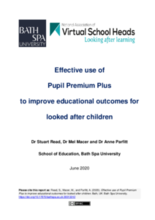Displaying 381 - 390 of 2221
Based on 39 semi-directed individual interviews with social workers from child welfare services, the current study aims at highlighting how social workers come to the decision to remove a child from parental care, and how they choose a foster family.
A mixed method correlational exploratory pilot was conducted in Washington State to determine items within the home study assessment that could be used as indicators to identify baseline requirements of the assessment and suggest anticipated depth (expansion or reduction) within the required topic(s).
The goal of this study is to identify predicative indicators that will assist in the development of a home study that will increase consistency within home studies and decrease timeliness of completion.
This report reviews specific national and international legal developments for the protection of children in Ireland; examines the scope and application of specific existing or proposed legislative provisions and to make comments/recommendations as appropriate; and reports on specific developments in legislation or litigation in relevant jurisdictions.
This research project aimed to study and inform the effective use of Pupil Premium Plus (PP+)-funded interventions to support educational outcomes for looked after children in the UK.
Drawing on the narratives offered by child and family social workers, this paper considers a series of possible explanations for Northern Ireland (NI)'s significantly lower out of home care rates.
This paper explores how college graduates with foster care histories fare after graduating from a 4-year college that offered a campus-based program.
This guidance from Miracle Foundation outlines case management process and tools aimed at children in Child Care Institutions (CCIs) in India who have been placed with their families during the COVID-19 pandemic. The purpose of these case management processes and tools is to determine feasibility of permanent placement and expedite family-based care in families in which children were placed quickly and without proper preparation during COVID-19 lockdown.
This study aims at comparing subjective well-being (SWB) of children in residential care and in foster families in two European territories or jurisdictions: Portugal and Catalonia (Spain).
The subject of investigation in this study is the principles of foster care, including the assumptions and solutions.



